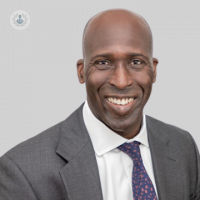Understanding frozen shoulder
Written by:Frozen shoulder, also known as adhesive capsulitis, is a condition that can cause pain and restricted movement in the shoulder joint.
In this article, leading orthopaedic and trauma surgeon in London, Mr Yemi Pearse explores the key aspects of frozen shoulder, including its causes, symptoms, diagnosis, and management options.

What is frozen shoulder?
Frozen shoulder is a condition characterised by shoulder pain and stiffness. Most articles suggest that it progresses through three stages; the freezing stage (pain predominates), the frozen stage (stiffness predominates), and the thawing stage (gradual reduction in pain and improvement in range of motion). However, this is a simplification and many frozen shoulders do not follow this pattern.
A joint is where two bones meet and joints exist to allow movement of one bone relative to the other. The shoulder is a ball and socket joint and, like many joints, it has a membrane that surrounds the joint, linking the ball to the socket. This membrane is called the capsule and it has some slack and some stretch to allow the ball to move relative to the socket.
Four processes occur when a frozen shoulder develops:
- The lining of the capsule can become very inflamed and can cause a constant deep-seated ache in the shoulder (inflammatory pain).
- The capsule contracts and loses its stretch and slack and shoulder movement is restricted.
- The capsule becomes very sensitive and any pull on the contracted capsule causes pain. This pain occurs with movement, usually most painful at the limit of the range of movement.
- The muscles that move the shoulder blade have to work harder to compensate for the reduced flexibility of the shoulder joint and patients can develop achy pain around the neck and shoulder blade.
Patients can have different degrees of these symptoms. Some never have the constant deep-seated inflammatory pain and in others it is severe and disrupts sleep. This usually last for about six months and then goes away. The restriction of movement, movement-related pain and achy pain around the neck and shoulder blade usually get progressively worse over a six-to-12-month period and then get better over a further six to 12 months: these symptoms get better and go away on their own 18 to 24 months after they start in about 70 per cent of patients. They limit function and make everyday activities like reaching overhead, behind your back, or out to the side and many sports activities difficult or impossible.
What causes frozen shoulder?
The exact cause of frozen shoulder is uncertain, but there are several risk factors and associations. It's more common in (but not only seen in) individuals aged 40 to 60, and it tends to affect women more than men. People with diabetes are at a higher risk of developing frozen shoulder but developing a frozen shoulder does not increase your chances of developing diabetes. There is a weaker association with other medical conditions such as heart disease and thyroid disorders.
How is frozen shoulder diagnosed?
The diagnosis is based on symptoms and physical findings. Several other conditions can present with similar features to a frozen shoulder and imaging can help exclude these other conditions. Your general practitioner may request an XRAY, but other imaging modalities should be requested by someone who is able to interpret the relevance of the findings.
What are the management options for frozen shoulder?
The various treatment options for a frozen shoulder can relieve pain, resolve pain, improve range of movement, restore normal range of movement and speed up the return to a normal shoulder. Most patients start with activity modification, medications such as non-steroidal anti-inflammatory drugs and physical therapy (including exercises, stretches, manual therapy and home exercises) and these can be very beneficial. You should consult an expert if symptoms do not improve to discuss the pros and cons of other treatment options in order to determine which option is best for you. Every patient has different activities that are limited by their symptoms and different time pressures and goals. Once he establishes the diagnosis, Mr Pearse tailors his advice about management to your individual circumstances.
If you require expert individualised advice regarding treatment for your frozen shoulder, arrange a consultation with Mr Pearse via his Top Doctors profile.


